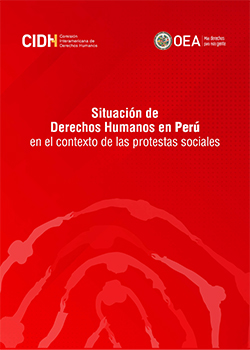
Press Release
IACHR Releases Report on the Situation of Human Rights in Peru
May 3, 2023
Contact info
IACHR Press Office
Distribution List
The Inter-American Commission on Human Rights (IACHR) has issued the report Situation of Human Rights in Peru in the Context of Social Protests, in which it addresses the crisis affecting society and democratic institutions in the country as observed by the IACHR during a working visit conducted from January 11 to January 13, 2023.
The report focuses on events that happened over the period December 7, 2022–January 23, 2023, and goes through them chronologically in great detail. To draft this report, the IACHR used interviews and information gathered on site, as well as supplementary data gathered after the visit, mostly from official sources.
In its analysis, the Commission notes that the protests that started on December 7, 2022, were a response to explicit and circumstantial political demands. However, at a deeper level, they reflected demands pressed by peasant communities and indigenous peoples, and the State needs to address these. Some examples are demands for equal access to rights without discrimination, greater political representation, prior consultation concerning extractive projects, and a fair distribution of the wealth generated by these projects.
One of the report’s main findings is that there has been a widespread deterioration of public debate, with major stigma based on ethnic-racial and regional grounds, as well as significant tensions between Lima and other regions where peasants and indigenous persons are a majority. This situation is made worse by clashes between the different branches of government and by successive political crises in the country since 2016, which have deepened social polarization and mistrust in institutions.
Protests since December 7, 2022, involved some violence that was unwarranted based on the right to protest. However, the Commission found that the response of State forces had not been uniform across the country and that there had been some serious instances involving an excessive use of force. The information gathered by the IACHR in Lima, Ica, Arequipa, and Cusco shows that the disproportionate, indiscriminate, and lethal use of force was a major element of the State response to the protests. This is supported by factors including the high numbers of people killed and injured with shots (including pellets) to the top half of their bodies and the fact that a significant number of victims were not even involved in the protests or simply happened near the areas where clashes erupted.
In Ayacucho, there were serious human rights violations that need to be investigated with due diligence and with an ethnic-racial focus. The Commission notes in its report that killings perpetrated by officers of the State may amount to extrajudicial killings. Further—since there were in fact many violations of the right to life in specific circumstances in terms of how, when, and where they happened—they might also amount to a massacre.
In Juliaca, the IACHR found that there had been several instances of an excessive and indiscriminate use of force by officers of the State, which allegedly caused serious human rights violations against both protest participants and bystanders. All this happened in a complex and violent context, which started with clashes on airport grounds as law enforcement officers were attacked with stones, sticks, and other projectiles, including hazelnuts.
In its conclusions, the Commission further notes that monitoring the crisis in Peru requires broad, genuine, and inclusive talks with an intercultural and territorial focus, where all the different groups in society are adequately represented. The IACHR also makes recommendations concerning dialogue and efforts to overcome the crisis; concerning citizen security; concerning reparations and assistance for victims of human rights violations; concerning the fight against impunity; concerning democratic institutions; and concerning freedom of expression, assembly, and association.
The IACHR thanks the State for its openness to international scrutiny. In particular, the Commission thanks the State for all the information it provided before, during, and after the visit, and it also thanks civil society organizations and other social groups, as well as victims and their families.
A principal, autonomous body of the Organization of American States (OAS), the IACHR derives its mandate from the OAS Charter and the American Convention on Human Rights. The Inter-American Commission has a mandate to promote respect for and to defend human rights in the region and acts as a consultative body to the OAS in this area. The Commission is composed of seven independent members who are elected in an individual capacity by the OAS General Assembly and who do not represent their countries of origin or residence.
No. 083/23
6:10 PM



